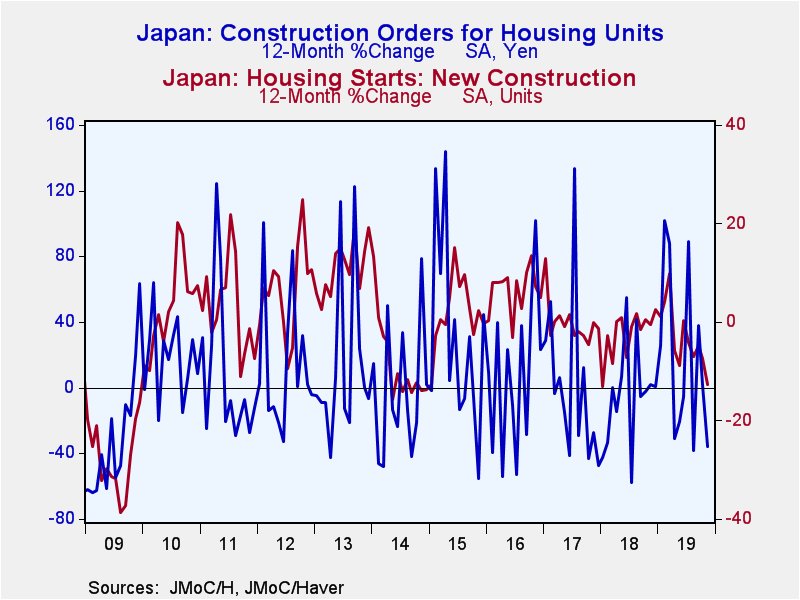 Global| Dec 26 2019
Global| Dec 26 2019Japan's Housing Starts and Orders Fall As BOJ Undershooting Continues
Summary
Japan's housing starts fell for the second month in a row in November. With a shirking population, housing is not the vibrant industry it once was. The housing market was impacted in the global recession, but it did recover from [...]
 Japan's housing starts fell for the second month in a row in November. With a shirking population, housing is not the vibrant industry it once was. The housing market was impacted in the global recession, but it did recover from recession and other extraordinary events from 2014 through 2016 as starts rose broadly and consistently. But from 2016 onward, the starts trend began to wither. Starts were lower on balance over five years from 2018 to early-2019 and now in late-2019 after a series of months with five year gains, that five-year negative trend has returned. Once again Japan's housing sector is weakening broadly as well as year-over year and with falling starts and weakening orders
Japan's housing starts fell for the second month in a row in November. With a shirking population, housing is not the vibrant industry it once was. The housing market was impacted in the global recession, but it did recover from recession and other extraordinary events from 2014 through 2016 as starts rose broadly and consistently. But from 2016 onward, the starts trend began to wither. Starts were lower on balance over five years from 2018 to early-2019 and now in late-2019 after a series of months with five year gains, that five-year negative trend has returned. Once again Japan's housing sector is weakening broadly as well as year-over year and with falling starts and weakening orders
Japan's economy has been under pressure and that continues to be the case. The recent Bank of Japan meeting found Governor Kuroda still trying to instill confidence in the central bank by promising to become more accommodative if there were signs that the 2% target were not going to be hit.
Consumer confidence in Japan continues to be weak even though it has recently rebounded after a long period of erosion. But Japan's service sector has recently fallen off sharply with its diffusion reading just marginally above the break-even value of 50. Manufacturing is declining and has a diffusion reading below 50 for a series of months. Japan's economy remains weak. In the wake of the hike in the consumption tax retail sales have become volatile and their trend is unclear.
Japan's actual inflation situation is in a state of chronic undershooting, much the same as Europe. Of course, the Fed in the U.S. has been undershooting for an extended period as well (ever since the target was adopted in 2012, in fact). But the undershoot in the U.S. by now is more moderate. Still, the Bank of Japan continues to use this target as the basis for policy and seems more concerned about the impact of chronic misses on its credibility than other central banks.

In the U.S., the Fed continues to construe its performance as close to target and despite undershooting, it does not seem to have the same sort of angst over missing its target as the BOJ. In Europe, policy hawks are much more concerned with the policies that have been launched and justified since there has been an inflation undershoot than they are concerned about the undershoot itself. Europe is split between those who take the target seriously and literally and those who are content to have inflation below 2%. Despite very similar- in fact nearly identical inflation targets in the U.S., Japan and in Europe, central banks have very different approaches to how they view their performance and define their success in achieving their respective targets. The BOJ seems to take its target to heart more than the Fed or the ECB.
Robert Brusca
AuthorMore in Author Profile »Robert A. Brusca is Chief Economist of Fact and Opinion Economics, a consulting firm he founded in Manhattan. He has been an economist on Wall Street for over 25 years. He has visited central banking and large institutional clients in over 30 countries in his career as an economist. Mr. Brusca was a Divisional Research Chief at the Federal Reserve Bank of NY (Chief of the International Financial markets Division), a Fed Watcher at Irving Trust and Chief Economist at Nikko Securities International. He is widely quoted and appears in various media. Mr. Brusca holds an MA and Ph.D. in economics from Michigan State University and a BA in Economics from the University of Michigan. His research pursues his strong interests in non aligned policy economics as well as international economics. FAO Economics’ research targets investors to assist them in making better investment decisions in stocks, bonds and in a variety of international assets. The company does not manage money and has no conflicts in giving economic advice.
More Economy in Brief
 Global| Feb 05 2026
Global| Feb 05 2026Charts of the Week: Balanced Policy, Resilient Data and AI Narratives
by:Andrew Cates






